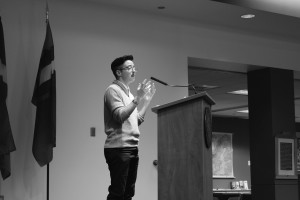Helen Smith
News Writer
smithhe@plu.edu

“Roots of Resilience” is the theme for this year’s Spotlight Series of lectures. The annual Pacific Lutheran University tradition aims to examine humanity’s capacity to overcome.
The most recent lecture in the series titled “Romantic Notions: Soldiers, Spouses and the Limits of LGBT Equality” was given by Seattle University School of Law associate Professor Dean Spade.
His lecture focused on the current goals and milestones in activism, and why the benchmarks are not as progressive as they seem.
Spade argued the goals of current activism only help the most privileged of the disenfranchised.Those who need the most help are still in the same vulnerable positions they were in before these milestones were reached.
He used himself as an example, commenting on how solving all of his problems as a transgender man would do nothing for a transgender person of color in prison.
Getting laws passed to address these issues isn’t helpful, he says – they don’t make situations better for people who really need it. Legal action often only affects things just enough to make it look like something has changed without creating a significant difference. This is based off of the assumption that changing things for the most privileged will eventually help the most disenfranchised, which has repeatedly been proven wrong in the past.
Spade argued that by passing certain laws, it gives society the chance to say the problem has been solved, when it really hasn’t.
The enforcement of activism through politics serves to expand institutions that are some of the worst agents of oppression like the police force and the military, including the recent immigration reforms which make it more difficult for criminals to cross the border. Spade said these types of results often end up being more divisive than successful.
“Reforms often divide between the deserving and the undeserving,” Spade said. “In Obama’s recent executive action he said, ‘Let’s have people who are parents of American citizens have a pathway, so we’re going to target the felons not the families.’ In that same piece of executive action he granted a small amount of relief, he also enhanced immigration reinforcement. Think about which immigrants are most likely to have criminal records: people with darker skin, poorer people, people in more desperate situations, people who live in more policed neighborhoods. We’re starting to see the more vulnerable people are getting left out.”
Spade’s line of thinking revealed a whole new way to look at people who are often considered undeserving of activist help to better their situations and called for a reexamination of who movements are leaving out, and why.
Throughout Spade’s talk, he questioned the ways that people normally think of to deal with social justice issues and the goals that activists should be striving for. He called for a closer examination of activists’ actions and their effects, who they help, who they leave disenfranchised and what they’re doing to help people who need it the most.
”It was a wealth of information,” said graduate student Kristen Williams. “I would say he was great; I recommend someone else go out and see him.”


















